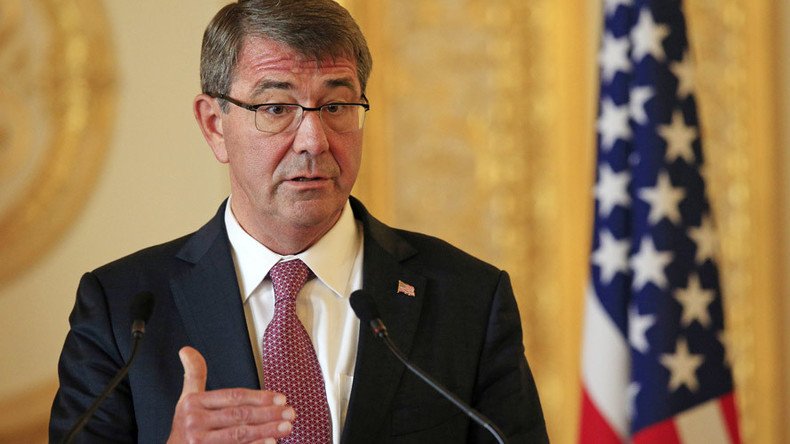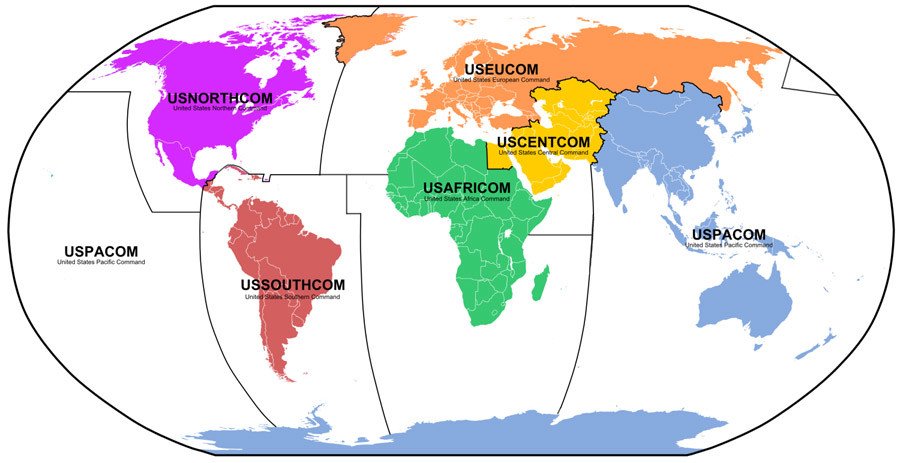Phantom dangers, imperial networks: How Pentagon sees the world

The world is threatened by Russia, China, Iran, North Korea – and oh yes, Islamic State – and its only hope is America, backed by loyal allies all over the globe. That is the vision the Pentagon chief has painted, with President Hillary Clinton in mind.
US Defense Secretary Ashton “Ash” Carter outlined his view of America’s strategic challenges at a conference hosted by the Center for New American Security (CNAS) on Monday in Washington, DC. While the Pentagon chief said he would be “extremely careful not to comment on the election,” the content of his presentation very clearly favored the establishment line that has been embraced by Clinton and threatened by Donald Trump’s calls to put “America first.”
‘America First’: #Trump lays out foreign policy vision in Washington speech https://t.co/h6PdlOBGjPpic.twitter.com/hyGan9yH3j
— RT (@RT_com) April 28, 2016
While Trump has been critical of US involvement around the globe, Carter argued that America is the “underwriter of global security” thanks to its “long-time network of allies and partners in every corner of the world.”
That is no exaggeration. As of Monday, the US had 187,000 troops deployed in 140 countries, according to Army Chief of Staff General Mark Milley. Note, also, that the US Department of Defense has carved up the world into six “combat commands.” So busy is the Pentagon occupying the world, the US government had to set up a separate Department of Homeland Security after the 9/11 terrorist attacks.

The “network” part is the buzzword around which the entire presentation was built, from the headline to the punchline. The words “network” or “networking” appear no less than 60 times in Carter’s speech.
As the “quintessential example of nations working together, and networking together, to respond to security challenges,” Carter named NATO, the US-dominated military alliance established in 1948. Not only did the US not dissolve this alliance at the end of the Cold War, it is currently trying to establish something like it in East Asia, judging by Carter’s presentation.
NATO and other “networks” of US allies around the globe are based on principles, standards and ideals, the Pentagon chief argued, citing as examples “resolving disputes peacefully” and “ensuring countries can make their own security and economic choices free from coercion and intimidation.” One ought to ask the people of Serbia or Libya, or Turkey’s Kurdish subjects about NATO’s proclivity for peaceful resolution of disputes.
As for the security and economic choices, look what happens to countries that choose differently from Washington’s desires – from Yugoslavia (now former), Libya (now chaos), and Syria (now a ruin) to Ukraine, where the government that chose good relations with Russia was overthrown in a coup and replaced by Nazis who sent tanks to crush dissent. But no, those are democratic reformers, and the resistance to their “anti-terrorist operation” is really “Russian aggression,” as Carter keeps repeating in hopes of precluding rational thought.
You see, when NATO masses an armada off the Russian coast or along the Russian border, that’s “deterrence” and defense and “underwriting security,” but when Russian planes fly over those ships or hover a hundred miles off the coast of California, that’s “unprofessional behavior” and “aggression.”
NATO has spent the past 25 years marching East, gobbling up “states” carved out of the corpses of Yugoslavia and the Soviet Union so that it is now literally sitting on Russia’s doorstep – yet in Carter’s upside-down universe, NATO is the one being threatened by “Russian aggression.”
Welcome to Pentagon logic, folks, the looking-glass world in which NATO destroying countries on a whim whenever US “non-governmental organizations” fail to overthrow their governments in color coups is considered upholding the “principled international order” while any resistance to such schemes is “aggression” or “malignant behavior.”
Lest you think I’m projecting the way Carter does, Russia was actually the first of the five “challenges” listed by the Pentagon boss in the CNAS address, followed by China, North Korea, Iran – and only then, as an afterthought, the so-called Islamic State (IS formerly ISIS/ISIL). Even when he got around to talking about the Middle East, Carter brought up Iran first. To him, IS is a cancer, with a “parent tumor” to be defeated in Iraq and Syria and “metastases” elsewhere, meaning that Washington sees the struggle against the faux-caliphate as never-ending. That’s bad news for victims of IS, but great news for the US “defense contractors” and their place at the taxpayer trough.
In September 2015, after a year of bombing by the US-led coalition – another one of Carter’s “networks” – IS was showing no sign of being even mildly inconvenienced. Russia’s modest expeditionary force was deployed to Syria in October, and had the head-choppers on the run within a month. But to hear Washington say it, Russia was actually ‘helping’ jihadists and bombing the ‘good democrats’ of the US-backed “opposition.”
Though many Americans – including Trump – said they were happy to see Russia decimated the terrorists, but US officials insisted on their fantasy that Russian strikes were either counterproductive, targeting civilians, or nonexistent. That’s because, according to the Pentagon, each regional network (there’s that word again) needs “a nation and a military to enable it” – meaning, obviously, the United States and definitely not Russia, China, or anyone else, ever.
Trump: ‘I want to get along with Russia’ (VIDEO)https://t.co/exFZTbDPB4@calebmaupinpic.twitter.com/5hwMAcztB5
— RT America (@RT_America) March 22, 2016
It is no accident that Carter gave this particular speech at CNAS. The think-tank created in 2007 has been the go-to source of foreign policy and security advice for the Obama administration – all of it in service of US global hegemony. Most recently, in March this year, CNAS published a pamphlet titled “Extending American Power: Strategies to Expand US Engagement in a Competitive World Order,” advocating pretty much what it says on the tin. One of its lead authors is Robert Kagan, co-author of the notorious 1996 “benevolent global hegemony” doctrine – and husband of Victoria Nuland, of Kiev cookies fame.
Nebojsa Malic for RT
The statements, views and opinions expressed in this column are solely those of the author and do not necessarily represent those of RT.













